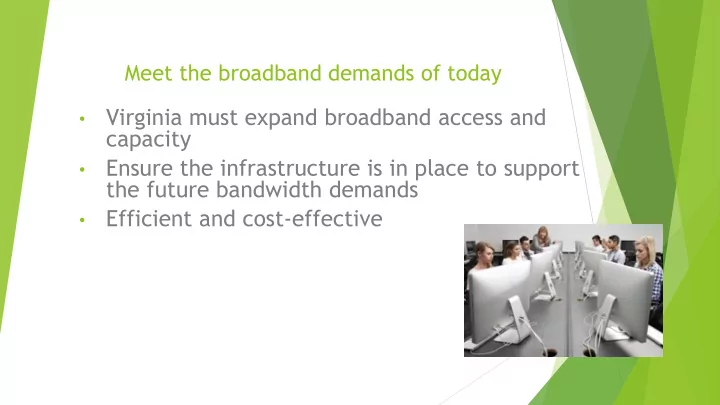

Meet the broadband demands of today Virginia must expand broadband access and • capacity Ensure the infrastructure is in place to support • the future bandwidth demands Efficient and cost-effective •
Virginia must enable broadband providers to enter new markets and deploy high-speed networks No matter where one resides in the Commonwealth… Broadband has become an essential infrastructure need like water, sewer and gas According to VEDP, there are an estimated 900,000 Virginians without access to broadband (high-speed internet access)
Virginians must have broadband access to: • Participate in the new Virginia economy- business attraction is one of the many economic impacts associated with expanded broadband access • Expand educational opportunities- Virginia public schools, colleges and universities need access to internet for many of their courses. Students in many rural areas do not have access to meet these requirements making it nearly impossible to complete work. • Benefit from advances in health information technology • Reduce environmental impact by teleworking • Facilitate entrepreneurship and innovation
The Wrong Way To often, government throws taxpayer dollars at a need like this Bristol, Virginia should serve as a cautionary tale. That city built a broadband network by way of federal and state grants – and taxpayer dollars. The Bristol network cost taxpayers over $100 million and it’s now being sold for about half of that amount, leaving taxpayers with tens of millions in losses.
The Right Way Remove barriers for private service providers at no cost to taxpayers • HB 1283 will remove a major deployment barrier • HB 1283 will lower per-mile cost, especially in rural areas
THE RIGHT WAY 2016 SESSION, HB 912 J. Randall Minchew HB 912 Allows the Department of Transportation to permit broadband service providers to install conduit capable of housing fiber optic cable to provide broadband service on public highways.
BREAK DOWN A SIGNIFICANT BARRIER WITH BROADBAND… COST Currently, broadband expansion by private providers is often cost prohibitive, especially in rural areas Broadband construction costs can range from $20,000 - $100,000 per mile - dependent on ground, terrain, density, etc. Utility pole attachment and make-ready fees
Since co- ops don’t profit from broadband, they have no incentive to make access to utility poles affordable The utility companies in rural areas where the need for broadband is greatest are electric utility cooperatives owned by customers These are the same customers who would benefit enormously from improved access to affordable highspeed broadband The customer-owned utility co-ops control the networks of existing poles and easements They have a narrow focus on their “bottom line”
Rural Electric Co-ops in Virginia, Maryland, and Delaware
LOOK AT THE BASIC ELEMENTS AND WHO OWNS THEM ➢ The home of the consumer ➢ Utility poles ➢ Wires ➢ One more thing that is very important-the ground under the utility poles
NARROW INTERESTS OF CO-OPS Whether they know it or not, many property owners actually own and pay taxes on the strip of land the wires pass over and where the pole sits. If they purchase electricity, they also own a share of the pole and the wires So why is it that co-ops are indifferent to the need for more affordable broadband access? The simple answer is that utility companies are only allowed to sell electricity Co- ops are driven to protect their “bottom - line” There is no incentive to recognize that rural customers need broadband that could come on the same poles if it was cost-effective for private providers to expand networks farther into rural areas
CONSIDER THIS Co-ops in Virginia are ONLY allowed to engage in the distribution of electric power That does not include telecommunications (phones) or distribution of broadband The co- op’s utility poles are located in easements on private property The easements were acquired for the sole purpose of delivering power
Virginia Co-ops Pushing Limits Some co-ops rent space on utility poles which are located on private property to communications companies The fees are called attachment fees Co-ops also charge huge fees to “Make ready” poles This expands the use of the easement without permission from private property owners You might say some co-ops ask for forgiveness rather than permission
HB 1283 A NEW LAW TO LOWER DEPLOYMENT COSTS I was asked as a legislator to provide clarification that the co-ops are allowed to form agreements which would allow private communications companies access to utility poles for telecommunications HB 1283 would provide clarity HB 1283 would lower the cost for private broadband providers to expand into rural areas by improving access to existing poles owned by co-op customers and placed on their land in prescriptive easements
The tradeoff would help bring broadband to rural customers HB 1283 Utility easements; pole attachments. 2018 session SUMMARY AS INTRODUCED: “Utility easements; pole attachments. Declares that a public service company that has acquired a prescriptive easement that is used to provide electrical service is deemed to have the right to grant to a provider of broadband or other telecommunications services the right to attach its wires and appurtenant facilities to the public service company's poles, subject to the conditions that the public service company not charge pole attachment fees for five years and that the public utility and telecommunication service provider equally share the costs of making the poles ready.” The law would be permissive
A Win-Win This would: Significantly reduce cost of broadband expansion Benefit rural customers with better access to affordable high speed broadband Benefit co-ops by bringing new customers to rural electric co-ops by making rural areas more attractive
Recommend
More recommend